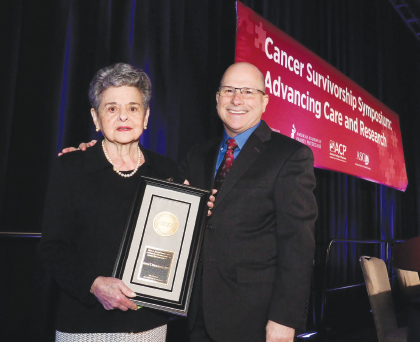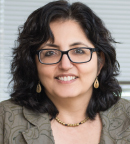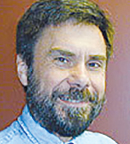Last year’s inaugural Cancer Survivorship Symposium stressed the importance of bringing together the fields of medical oncology and primary care to ensure a coordinated effort to help patients with cancer transition to long-term survivorship care. Building on that goal, the 2017 Cancer Survivorship Symposium: Advancing Care and Research—A Primary Care and Oncology Collaboration provided the attendees gathered at the event with best practices for monitoring late and long-term effects from cancer and its treatment; addressing the psychosocial aspects of survivorship; improving communication and care coordination; understanding current research findings in survivorship care; and providing surveillance guidelines for spotting cancer recurrence and second malignancies.
Cosponsored by ASCO, the American Academy of Family Physicians, and the American College of Physicians, this year’s 2-day symposium, which was held in January in San Diego, drew 650 oncologists, primary care physicians, nurses, physician assistants, nurse practitioners, cancer survivors, and patient advocacy organizations from around the country and presented more than 240 study abstracts. The study abstracts covered such diverse topics of survivorship care as care coordination and financial implications; survivor and provider communication; health promotion; late- and long-term effects and comorbidities; psychosocial issues; and recurrence and second malignancies.

Anna T. Meadows, MD, Professor Emeritus at the Children’s Hospital of Philadelphia and Perelman School of Medicine at the University of Pennsylvania, accepting the Ellen L. Stoval Award and Lecture for Advancement of Cancer Survivorship Care from Kevin C. Oeffinger, MD, Director of the Adult Long-Term Follow-Up Program at Memorial Sloan Kettering Cancer Center, at the 2017 Cancer Survivorship Symposium in San Diego on January 27, 2017. Photo ©ASCO/Todd Buchanan 2017.
The meeting began with the inaugural presentation of ASCO’s Ellen L. Stovall Award and Lecture for Advancement of Cancer Survivorship Care to Anna T. Meadows, MD, Professor Emeritus at the Children’s Hospital of Philadelphia and Perelman School of Medicine at the University of Pennsylvania, a pioneer in the field of survivorship research in children with cancer. The award was created in memory of Ellen L. Stovall—who died on January 5, 2016, after surviving three bouts of cancer over 44 years—in recognition of her more than 30 years of advocating for improved cancer care and for her leadership as President and CEO of the National Coalition for Cancer Survivorship and as the organization’s Senior Health Policy Advisor. The award will be presented each year at the Cancer Survivorship Symposium to a recipient who has made significant contributions to the issues affecting the lives of cancer survivors.
Rise of Cancer Survivorship
The learning objectives of this year’s symposium included defining the roles of members of multidisciplinary care teams; evaluating the relevance and application of genetic testing results in the development of coordinated survivorship care plans; comparing the emerging models of survivorship care to effectively implement a comprehensive approach and coordinate the transition to long-term survivorship plans; analyzing current research data to identify disparities in cancer survivorship and find ways to reduce these discrepancies in care delivery and patient outcomes; assessing the differences in international models of survivorship care within the health-care systems of both high- and low-resource countries; and discussing different approaches to communication and monitoring strategies that could aid patients in managing the uncertainties of cancer survivorship.

With this tremendous increase in cancer survivors, there is a need to ensure that everybody is aware of the major issues that cancer survivors face in both the short and long term. And it is equally important to understand how to deliver effective, yet financially sustainable care to the complex needs of cancer survivors.— Smita Bhatia, MD, MPH
Tweet this quote
“The cancer survivor population in the United States is now more than 15 million1 and has tripled since 1971,”2 said Smita Bhatia, MD, MPH, Professor and Vice Chair of Outcomes for Pediatrics and Director of the School of Medicine Institute for Cancer Outcomes and Survivorship at the University of Alabama at Birmingham and a member of the Cancer Survivorship Symposium’s Steering Committee. “With this tremendous increase in cancer survivors, there is a need to ensure that everybody is aware of the major issues that cancer survivors face in both the short and long term. And it is equally important to understand how to deliver effective, yet financially sustainable care to the complex needs of cancer survivors.”
Because caring for cancer survivors is so complex, said Dr. Bhatia, the responsibility has to be shared by both the oncology and primary care communities. “The complications and care needs of long-term cancer survivors have an expanded scope that not only includes the expertise of oncologists, but also cardiologists, endocrinologists, pulmonologists, dentists, and general practitioners. Bringing together oncologists and primary care physicians in this meeting to exchange ideas and research is helping us develop a collaborative platform that can disseminate our research findings to our respective communities and finally reach our goal of having an effective shared-care model in place for our cancer survivors.”
Coordinating Survivorship Care
One of the general sessions at the symposium that drew the most attention dealt with the need for a comprehensive model of survivorship care that identifies the components of what that care should include to predict and—potentially—prevent late effects from cancer and its treatment. Such a model would also provide surveillance guidance to monitor for second malignancies, which would be presented to every cancer patient as he or she transitions to survivorship care.

This is an important arena in which we have oncologists speaking with primary care physicians in ways that don’t usually happen in other places.— Mark Yeazel, MD, MPH
Tweet this quote
“The understanding of how to work with and help promote the health of every cancer survivor is an area that hasn’t been stressed before to primary care physicians. We are at the beginning of understanding what to do when there is a cancer survivor sitting across from us in the exam room,” said Mark Yeazel, MD, MPH, Associate Professor in the Department of Family Medicine and Community Health at the University of Minnesota and Chair of the Steering Committee for this year’s Cancer Survivorship Symposium. “One promising aspect that came out of this meeting is that we are beginning to make progress in getting someone—the oncologist or another health-care provider—to complete a care plan for every patient. Now, we are debating what that content should include and how comprehensive it needs to be.”
He continued: “We had physicians at the meeting saying that they don’t have enough time to read through 4- to 8-page care plans and that 2 pages with bulleted summaries of the patient’s cancer history would suffice. We also need to delineate how to share the responsibility of caring for that patient. Deciding what should be done and who should provide care during a patient’s survivorship is a missing piece of this discussion that should be coming in the next few years.”
According to Dr. Bhatia, ASCO is in the process of developing long-term survivorship care guidelines that general practitioners will be able to easily access through a variety of technology platforms to improve their comfort level in caring for patients with a history of cancer and ultimately reduce care burden.
Forging Partnerships
The Cancer Survivorship Symposium, said Dr. Yeazel, provides a welcoming environment for medical professionals from different specialties, with the sole goal of learning how best to care for the myriad needs of survivors following a cancer diagnosis. “This is an important arena in which we have oncologists speaking with primary care physicians in ways that don’t usually happen in other places,” he said. ■
Disclosure: Drs. Bhatia and Yeazel reported no potential conflicts of interest.
References
1. American Cancer Society: Cancer Treatment & Survivorship Facts & Figures, 2016–2017. Available at cancer.org/content/dam/cancer-org/research/cancer-facts-and-statistics/cancer-treatment-and-survivorship-facts-and-figures/cancer-treatment-and-survivorship-facts-and-figures-2016-2017.pdf. Accessed February 21, 2017.

